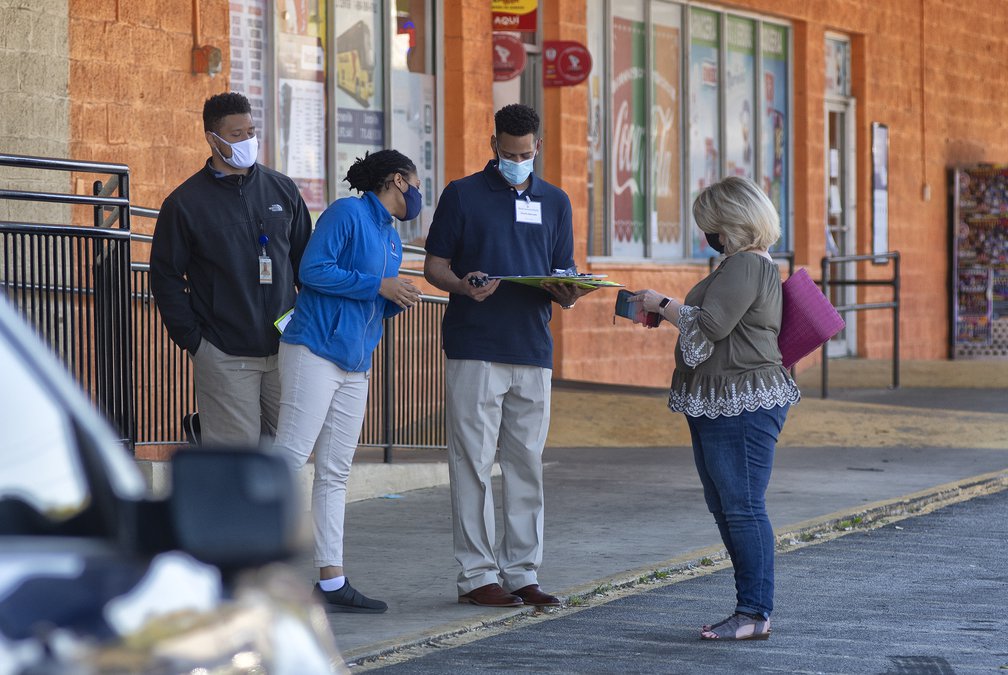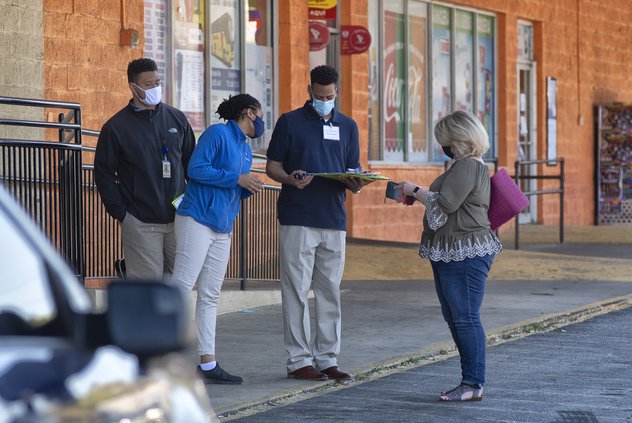The Northeast Georgia Health System is sponsoring coverage directly related to public safety so that it can be made available free to non-subscribers as a public service. News coverage is independently reported. We know that you need accurate and up-to-date information about the effects of the coronavirus in the state and our region. Please consider supporting our work by subscribing to The Times.
If the United States is to return “back to normal” and enter a post-COVID-19 world, federal health experts say that approximately 70% of the population need to be vaccinated to achieve herd immunity.
According to the Centers for Disease Control and Prevention, more than 50% of the U.S. population has received at least one dose of the vaccine. But in Georgia, those efforts have stalled, nearly a month after Gov. Brian Kemp expanded vaccine eligibility to Georgians 16 and older on March 25.
As of April 26, just 23% of Georgians are fully vaccinated and 34% have received at least one dose. In Hall County, only 16% are full vaccinated and 20% have receive one dose.
According to Emory University vaccinologist Robert Bednarczyk, Georgia ranks 45th in the nation in the percentage of residents who have received at least one COVID-19 vaccine dose.
While most states range in the 30% to 59% percent rate for one-dose percentages, Bednarczyk said that Georgia has some catching up to do.
“Even with recent gains, we still have a way to go to protect all Georgians,” said Bednarczyk “Georgia is still lagging behind many other states, but as (we’re) seeing more vaccination sites opening up their availability, I am hopeful that we can get more people vaccinated quickly.”
Local vaccination efforts in Hall County are ramping up.


According to Zachary Taylor, District 2 public health director for the Georgia Department of Public Health, since March 1, Hall County’s vaccine supplies have improved, with 800 to 1,100 doses of the vaccine administered per day.
At the time of publication, Hall County Health Department has given a total of 60,660 doses, with local health departments administering 205,000 vaccines throughout the 13-county district.
However, District 2 spokesperson Dave Palmer said that more work needs to be done.
“We still have a lot of work to do to vaccinate young people and underserved minority populations,” Palmer said.
When COVID-19 started to take a toll on Gainesville’s Latino community in the early months of the pandemic, Norma Hernandez, president of the Latino Chamber of Commerce, told Gov. Kemp that she wanted to be on the ground helping with messaging efforts.
“I told (Kemp) that we were going to attack (vaccination efforts) in our community the same way we did when people didn’t wear a mask or get tested,”said Hernandez, who was appointed to the state’s public health equity council last month. “We started with a strong messaging campaign and the more we talked to people and more we got them to realize the importance of getting vaccinated, the more people have shown up.”
Since their first mass vaccination event at the Gainesville Ballroom on Atlanta Highway on March 13, Hernandez said that local county vaccination events have been responsible for 1,932 vaccine doses administered.


On May 1, Hernandez hopes to administer 1,000 more doses at the county’s mass vaccination site at the University of North Georgia in Oakwood.
A large portion of vaccines from these community events, according to Hernandez, has been given to Gainesville’s Latino community.
“I’m so proud of my community because now we have people saying ‘Norma, when is the next vaccine event’ and we’re seeing more and more interest with each event,” she said. “I think that there is still hesitancy, but I would urge those people to talk to a health professional and to Google further information about the vaccine and its effects.”
COVID-19 doesn’t discriminate, and Hernandez said vaccination efforts are designed to help all residents.
“This isn’t about a single race, color, belief. It’s about everyone in Hall County,” she said. “It’s about getting as many people vaccinated so we can kill this virus and keep everyone safe.”
The Hall County School District has also ramped up its efforts to get shots in arms, collaborating with Hall County Health Department to provide priority appointments of the Pfizer vaccine to employees, parents and students.
The appointments can be scheduled on the next two Tuesdays, April 27 and May 4 at the UNG Gym in Oakwood.
Tamara Etterling, director of student services for the Hall County School District, said that there have been very few concerns regarding the vaccine.
“Our messaging has focused on the positive results of our community being vaccinated against this virus,” she said. “Early on, our school nurses made an educational video, which was shown to over 3,500 of our team members. This personal testimony and information was well received.”
Etterling said “success is being shown in low levels of viral transmission and high levels of school attendance.”
As for health professionals, more than 6,000 out of the Northeast Georgia Health System’s 10,000 plus workforce has received a dose. So far, 5,800 are fully vaccinated.
Melissa Frank, director of pharmacy services for NGHS said that there has been a delay in employee vaccinations after the state paused the one-shot Johnson & Johnson vaccine last week over six cases where recipients had developed blood clots.
“Some NGHS employees were waiting for the Johnson & Johnson vaccine to become available so they could get the single-shot version,” she said. “After this week’s news, many of them scheduled appointments to receive their first dose of the Moderna or Pfizer vaccine because they didn’t want to wait any longer.”
On April 23, the Advisory Committee on Immunization Practices, a panel that guides government on vaccine use, voted to resume the use of Johnson & Johnson’s one-dose shot via a 10 to 4 vote.
Bednarcyzk said that he hopes the state’s decision to pause the Johnson & Johnson vaccine can alleviate people’s concern about vaccine safety systems.
“To be able to identify and evaluate just six cases of the rare form of blood clots in a short period of time, and take this information back to policy makers shows me just how strong this system is,” he said. “This news has gotten a lot of attention, but it’s important to note that we have not seen similar types or levels of serious adverse events with the two mRNA vaccines, which have been much more widely used in the U.S.”




